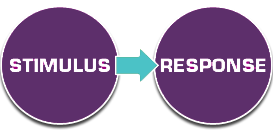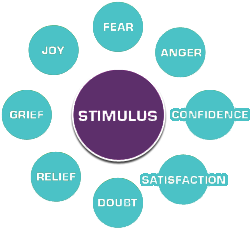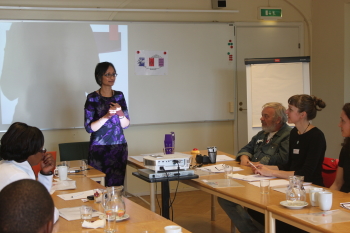UNDERLYING PRINCIPLES
We live in a ‘victim culture’. We’re taught that our environment determines who we are. I act the way I do because of my childhood, my boss, my spouse, the weather. So we try to change our environment, including the people around us. Sometimes we get downright controlling. Or we just feel like passive victims: if only this or that would happen, everything would be just fine.
The problem is that changing the things around us doesn’t work. Why? Because the ‘if onlys’ are always beyond our reach. There’s always something else that comes down the road: the loss of a job, conflict with children, catastrophic illness, not to mention the day to day difficulties of life.
Now, here’s the twist. We don’t have to change the things around us in order to change how we feel, act or think. Consider the classic stimulus-response model under which most of us operate.

| Stimulus | Responses |
|---|---|
| My boss yells at me. | I worry about my future employment. |
| My daughter gives me a hug. | I feel warm and grateful. |
| A dog runs up to me barking. | I freeze and am fearful. |

The stimulus response model is pretty well established and something most people subscribe to, but there’s a bit of a problem with it. Not everyone responds the same way to the same stimulus. When confronted with a dog running up and barking, one person freezes, another runs away, and a third kneels down to pet and hug the dog. When a political candidate wins a campaign, one group of people celebrates and another mourns. When faced with difficult challenges, one person relishes the opportunity and another bemoans the burden.
Using The Option Process®, we take the classic stimulus-response model and add one element: beliefs. What we believe acts as a filter for every stimulus we encounter. Change your beliefs, and you change your responses (how you feel, what you do).

Consider two students graduating from university. Same event. Same stimulus. Same situation. Yet one is elated and the other is terrified. How can that be? It all comes back to beliefs. The one grad believes her life will improve dramatically after graduation: independence, her own place, an exciting job. The other believes the world is frightening, it’s hard out there and success is just a pipe dream. Their beliefs make all the difference.
That’s just one example. Apply it to all the stimuli in our lives, and you quickly see how our thinking – not events or people – truly shapes us.
Good news: you can learn to systematically change your thinking, and using The Option Process Dialogue is a useful tool to do this. Using this process you are only one step away from getting to where you want to be!
Copied with permission from The Option Institute’s website http://www.option.org/the-option-institute/what-we-teach/37
“I absolutely love my dialogue sessions with Rekha! Not only is she a highly skilled mentor but she is fun, caring and loving. I find myself becoming more aware of my feelings and allowing myself to be a happier person. I would recommend Rekha’s dialogue and counseling services to anyone and everyone!”
“Dialoguing with Rekha was such a great experience. Her true loving and non-judgmental ways made it easy for me to find my way thru my own issues.”

